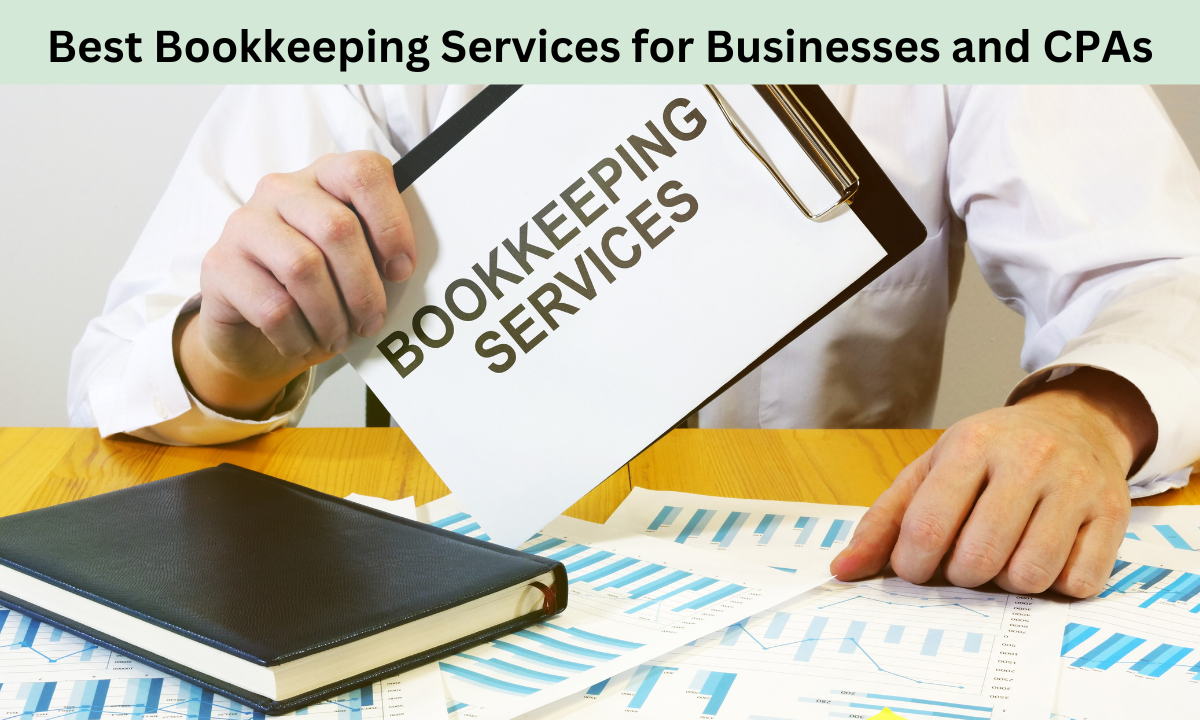Bookkeeping is an important task for running a successful business efficiently. However, many business owners and accountants find it challenging to manage bookkeeping along with their core responsibilities. This is where outsourcing bookkeeping to professional services can help. With the myriad of bookkeeping service providers available, choosing the right one suited to your needs is essential. This article discusses the key aspects to consider when finding the best bookkeeping services for businesses and CPAs.
Understanding Your Needs
The first step is to clearly understand your Bookkeeping Services for Businesses and CPAs requirements. Define the scope of work, type of industry, transaction volume, reporting needs etc. It is also important to set expectations around the level of handholding required from the provider.
For example, a small business just starting may need more support than a large established organisation. Accountants on the other hand would expect bookkeepers to work independently with minimal supervision. Carefully evaluating current processes and plans will help identify the skill sets and resources required from the service.
Key Considerations for Finding Best Bookkeeping Services for Businesses and CPAs

There are many important factors to examine when choosing a Bookkeeping Services for Businesses and CPAs. Taking the time to look at these key areas can help you pick a provider that best suits your operation.
- Experience – See how long a service has been in business and ask about their background. Experienced bookkeepers have likely encountered situations similar to yours. Look for those familiar with your industry as they will understand unique accounting needs.
- Accuracy – Bookkeeping requires entering financial data correctly. See what quality assurance checks a service has. Ask if work is reviewed by certified accountants. Accurate records are crucial for decision-making and tax compliance.
- Software – Review what accounting programs a service uses and their abilities. Consider if they integrate well with any software you currently use. Compatibility makes sharing information simpler between your operations.
- Services – Understand all the tasks included like data entry, bank reconciliations and financial reports. Consider add-ons like payroll processing or consulting. A full-service provider could save time versus using multiple sources.
- Communication – Find out how a bookkeeper will update you such as regular report meetings. Good services are available to answer questions. Frequent updates keep you informed on financial matters.
- Costs – Fees vary depending on work required and assistance level. Get pricing models to compare. Also enquire about additional charges so there are no surprises. The right bookkeeper offers fair rates for their experience and work required.
References – Speaking to current clients is a valuable way to check satisfaction. Ask reference bookkeepers about quality, reliability and issues handled. Hearing no complaints gives better trust in abilities.
When assessing Bookkeeping Services for Businesses and CPAs, concentrating on the above key areas ensures finding one able to handle records at a fair price. This lets you focus on running the business with full confidence in finances.
Technology Integration in Bookkeeping Services

Today’s bookkeepers utilise various technologies that benefit both clients and their own workflows. Looking at how a service leverages tech tools is an important part of evaluation.
Cloud Accounting – Most bookkeepers now use accounting programs hosted online. This provides secure remote access from any device. It means clients and bookkeepers can simultaneously view records from different places.
Integration Options – Reputable services take advantage of tools that connect business and accounting platforms. This syncs transactions and data between systems automatically to save time. Ask which accounting and CRM programs a bookkeeper has experience linking to.
Electronic Payments – Forward-thinking providers allow digital payment options that are convenient for clients. This lets you pay invoices securely through bank transfer or e-wallets instead of mailing cheques.
Client Portals – Many bookkeepers provide personalised web portals clients can sign into for 24/7 access to financial files, reports and communication. This centralised hub eliminates waiting for regular mail or calls to have questions answered.
Researching Potential Bookkeeping Service Providers
With a clear picture of needs, the next stage is to research potential Bookkeeping Services for Businesses and CPAs. Start by getting referrals from other businesses, accountants, chambers of commerce or industry associations. Online reviews and testimonials also provide valuable input. Shortlist some options based on service offerings, pricing structures and locations.
Most established bookkeepers have a good online presence with detailed company and portfolio information available. Arrange initial discovery calls to understand their approach, technology tools, security protocols and experience in your industry. Request quotes and ensure the ones under consideration can realistically meet expectations.
Scalability and Flexibility
As businesses grow and needs change, having scalable bookkeeping is important. The best services are adaptable and sized appropriately for fluctuating workloads.
Variable Project Teams – Larger providers can expand bookkeeping teams for clients at peak periods, like tax season. This ensures transactions are handled promptly without delays.
Pricing Adjustments – Bookkeepers should review pricing regularly with clients as requirements change. They offer flexible discounting or packages for adding more locations or staff needing assistance too.
Added Scope – As businesses develop, bookkeeping needs tend to broaden into advisory. Good firms cross-train team members to easily take on new roles like financial consulting or budgeting assistance.
Resource Reallocation – Seasoned bookkeepers learn each client’s flow, like reallocating less busy team periods to crunch times elsewhere. This maximises overall productivity across all accounts.
Checking Credentials and Expertise
A reliable bookkeeping partner needs to have skilled professionals managing the work. Check the qualifications, ongoing training and specialised certifications held by their accounting staff. Leading services employ CPAs, Enrolled Agents or those with relevant bachelor’s degrees, especially for complex bookkeeping needs.
Understand how they ensure quality standards and compliance with data security laws and accounting principles. Long-term experience in the domain and client portfolio size/industries served are also good indicators of expertise. References can then be followed up to gather first-hand feedback on service quality, reliability and relationship management.
Evaluating Pricing and Contracts
Bookkeeping Services for Businesses and CPAs costs vary depending on factors like transaction volume, customised requirements, reports needed, support required etc. Request proposals clearly outlining pricing models – whether it is per transaction, hourly, monthly or project-based. Check for any additional charges for ad-hoc or non-routine tasks. Understanding what is included as standard and where extra charges may apply is important.
Request samples of service agreements to evaluate terms, payment schedules, scope variations, confidentiality clauses and termination policies. One-time set-up fees also need to be factored in when evaluating total costs. Ensure selected providers offer scalable, flexible pricing tailored to your evolving business needs.
Evaluating Support and Accountability
Bookkeeping outsourcing should reduce the time spent rather than adding to it. Hence, support quality, turnaround times and account management styles are as important as technical skills. Find out providers’ client communication channels, service level agreements and turnaround promises for queries or changes.
Check if they leverage project managers or dedicated account representatives for oversight. Their approach to training new hires, performance reviews, and continuous improvement initiatives help assess long-term dependability. Signing up with a provider accountable for deliverables and proactive about updates is key to a fruitful partnership.
Online Reviews and Testimonials: Making the Final Selection
By now, shortlisted services can be fully evaluated based on offering fit, expertise, processes, pricing viability and quality commitment. References may be followed up one last time before selecting the best match. While price is a consideration, do not compromise on evaluating the core competencies required.
Signing a clearly defined statement of work, and reviewing performance benchmarks periodically. Have an open discussion about expectations to ensure seamless integration into each other’s businesses. With the right bookkeeping partner, business owners and accountants can save time for their core roles with financials taken care of accurately and efficiently.
Conclusion
To summarise, outsourcing bookkeeping when done right can offer numerous benefits. Understanding requirements in depth, comprehensively evaluating potential providers and negotiating suitable agreements sets the stage for lasting productive relationships.
With bookkeepers as a trusted extension of the finance team, both businesses and accountants gain the bandwidth to focus on growth and value-adding services. Choosing the best fit based on true needs ensures hassle-free, compliant and cost-effective bookkeeping support.
Frequently Asked Questions (FAQs)
Q: What is included in basic bookkeeping services?
A: Most providers offer bookkeeping essentials like data entry of bank transactions, invoices, bills and receipts. They perform monthly bank reconciliations and generate common reports including profit and loss statements, trial balances and balance sheets. Some basics are handling payroll transactions and ensuring tax compliance. More advanced services provide audit support and advisory roles for an added cost.
Q: How quickly can bookkeepers process financial transactions?
A: Transaction processing speeds depend on volume and provider resources. For the average small business, most reputable bookkeepers aim to enter transactions within a few days of receipt. Some can process regular expenses like utility bills as soon as they are uploaded.
Larger and more complex transactions may require additional validation before entry. During peak periods like month-end or tax time, turnaround can be a week or longer for more extensive work. Clients needing real-time updates should clarify expectations.
Q: What security measures do bookkeepers take?
A: Top bookkeepers safeguard financial data extensively using encrypted cloud platforms, server backup systems and tightly controlled user access. They secure workstations with antivirus, maintain offline record copies and conduct routine vulnerability testing.
Bookkeepers should be SOC1 or SOC2 certified and never use public Wi-Fi for client matters. Contracts specify data ownership and usage is forbidden for non-assigned work. Reputable firms undergo annual third-party security audits and promptly address any issues found.
Q: How are payment disputes or errors handled?
A: Conscientious bookkeepers carefully review all work for errors and stand behind their services. Minor errors are corrected immediately without charge. Payment issues should first be discussed with their accounts team or client success manager.
If unresolved, a second review is performed by a manager or accountant. Major discrepancies are rectified cooperatively through reimbursements or credits on upcoming invoices in good faith. Rarely are disputes not solvable through open communication and compromise on both ends. Timely issue resolution builds reliable long-term partnerships.
Also read:










